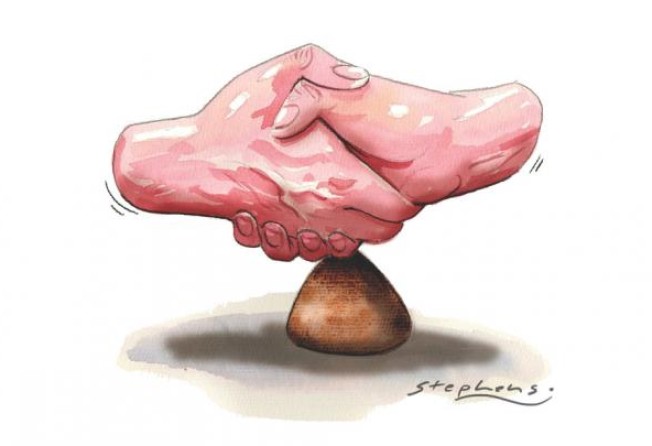Soft-power strategy to rebalance Asia
Andrew Leung says a peaceful world order cannot be built on the assumption of a zero-sum game of rivalry; instead, nations should help rising China take its place as a key member

After months of tension over the South China Sea, Communist Party general secretary Xi Jinping's meeting with Natsuo Yamaguchi, Japan's envoy and leader of the junior party in the ruling coalition, sends an unmistaken signal that while neither side is persuaded by the other's territorial claim, both realise that escalating confrontations can only make matters worse.
Concurrently, a whiff of fresh air on America's "Asia pivot" strategy was evident during Senator John Kerry's confirmation hearing for his nomination to be secretary of state. At the hearing, he said he was unconvinced of the need for a US "military ramp-up" in Asia and called for fresh thinking in relations with China. In particular, he is conscious of growing Chinese suspicions of an American "containment policy". "You know, the Chinese look at that and say, 'What's the United States doing? They trying to circle us? What's going on?" he was quoted as saying.
These are welcome signs. However, they are unlikely to change the resurgence of Japan's right-wing politics, or the US vigilance over China's intentions as the Asian giant regains its global influence.
According to a recent survey of US public opinion on their country's foreign policy, conducted by the Chicago Council on Global Affairs, most Americans continue to see US leadership as desirable but want a more co-operative stance. Towards China, while they are equally divided between thinking of it mostly as a partner (48 per cent) and mostly a rival (47 per cent), the percentage saying that China is mostly a partner has grown.
China's growing economic clout and muscularity in the South China Sea are, however, a clear concern. Most people (54 per cent) support the shift of military and diplomatic resources towards Asia.
We are likely to see less talk of an "Asian pivot" and more of "rebalancing". However, America's redoubled military and diplomatic ties with China's neighbours are empowering some countries to be more assertive, making America's efforts to rebalance the region more complicated.
A recent Asia Times article, by columnist Francesco Sisci, argues that a "G2" détente between the US and China may be a better approach to regional stability, even though China's response to such an overture has been lukewarm. Professor Hugh White of the Australian National University floats the idea of a "concert of Asia" to avoid a possible "deadly strategic rivalry". America is to partner and share regional power with China, along with India and Japan.
Zbigniew Brzezinski, a doyen in American foreign policy, has advanced a US worldview comprising a "larger West", by embracing Russia and Turkey in an enlarged European Union , and a "complex East", where the US would act as "regional balancer", similar to the role played by Britain in European politics before the early 20th century.
While each of these strategies has merit, they all assume a zero-sum game, which is unlikely to guarantee regional harmony, or stability. Perhaps it's time for some fresh thinking, as Kerry suggests.
First, admittedly, China will have to reform politically, sooner rather than later, as both party and national stability are at risk. It is clear that China remains unconvinced that the Western model of multiparty democracy could safely be copied at home, where circumstances are different.
However, Beijing appears amenable to a raft of reforms in its economy and society, as highlighted in a World Bank report co-authored with the Development Research Centre of China's State Council. These include financial liberalisation, reform of state-owned enterprises, development of a green economy and promotion of civil society. Helping China to deliver on these reforms is likely to transform the country into a more welcome member of the global community, while a "containment" policy is bound to result in the opposite.
Second, as the world has become not only multipolar but much more inter- dependent, it raises the question of whether the traditional thinking of fixed alliances remains fit for purpose. It is conceivable that diverse groupings of states and non-state actors, across ideological or political divides, could co-operate on an ad hoc basis to address common problems. These include climate change, resource depletion, water scarcity, poverty alleviation, piracy and terrorism.
On these issues, China has a crucial role to play. By now, it has grown too big and prominent for Deng Xiaoping's old dictum of maintaining a low profile to remain workable.
Third, it is instructive that Senator Kerry also refers to a bigger role for America in Africa, where China's engagement has thrown up important lessons for all. On the one hand, as Deborah Brautigam points out in her book, The Dragon's Gift: The Real Story of China in Africa, emerging from decades of Western aid addiction, many poor African countries have achieved real economic progress, thanks to China's infrastructural investments. On the other hand, China's African footprint has aroused local antagonism against the perceived lack of social responsibility, including encroachment of local informal economies, environmental disregard, want of local job creation, and poor labour relations.
Working with China to overcome these problems, perhaps in co-operation with the UN Development Programme and other non-state actors, is likely to yield mutual and common dividends.
No doubt there are many other examples for engagement with China in a similar vein. The Sino-US relationship will define the shape of the 21st century, and a soft-power strategy of partnership to address global issues promises to achieve the ultimate aim of bringing China into a more sustainable and harmonious world order, built on multilateral co-operation instead of confrontation and rivalries. This is what a hard-power pivot or rebalancing strategy is unlikely to deliver.
Andrew K. P. Leung is an international and independent China specialist based in Hong Kong